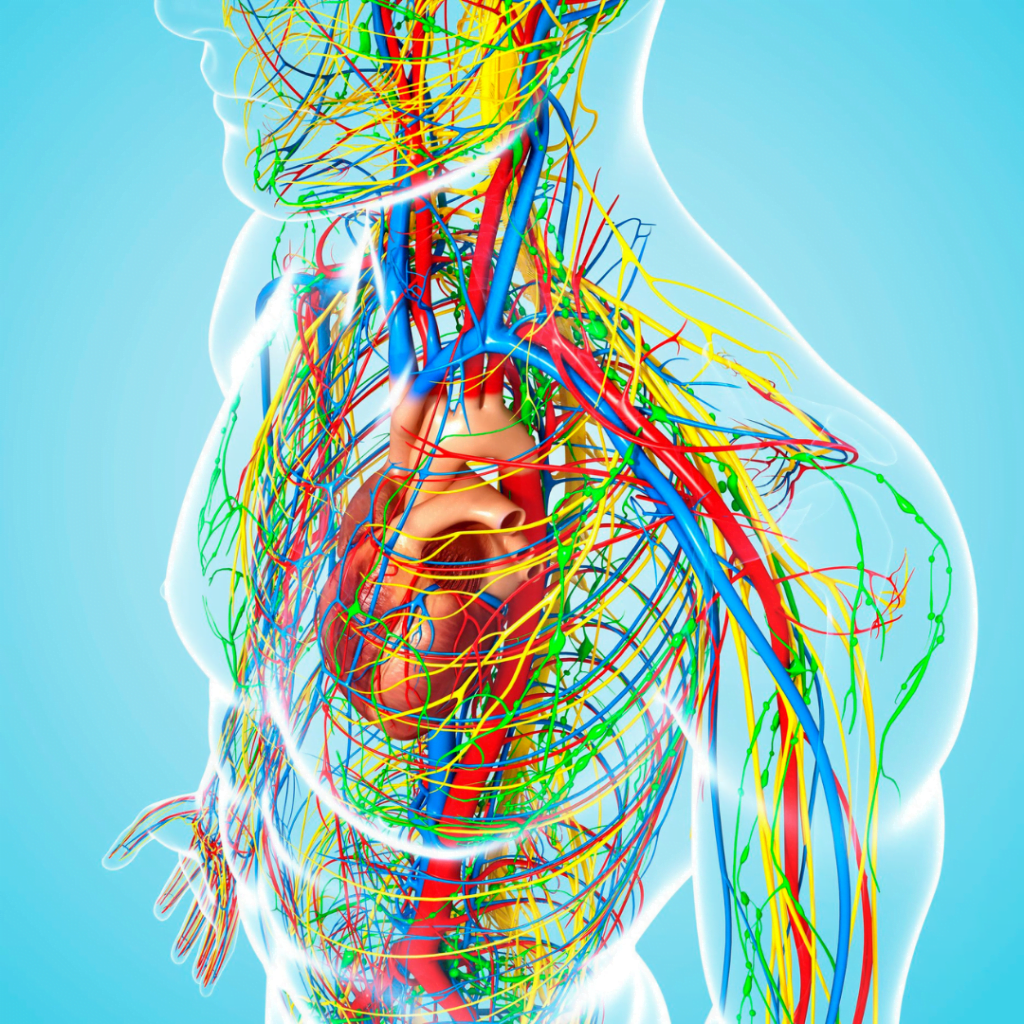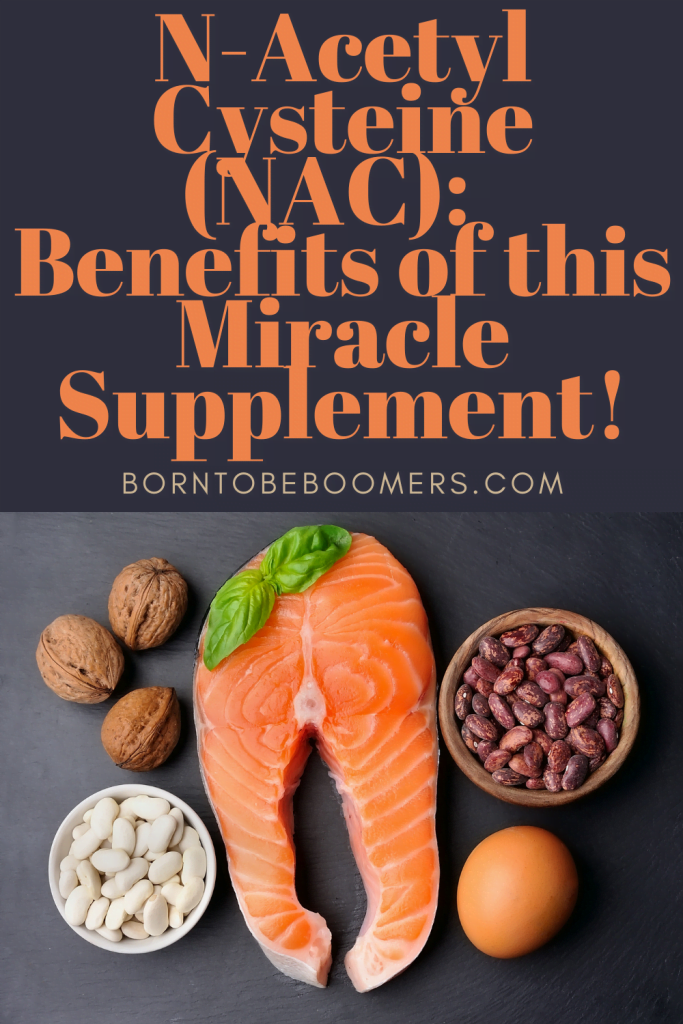N-Acetyl Cysteine (NAC) is a supplement form of cysteine (a semi-essential amino acid). It has been around for several decades, with over 40 years of scientific research backing up its medical effectiveness.
People around the globe take this supplement for various health reasons, including to help treat medical issues varying from psychological maladjustment to chronic lung diseases, heart diseases and even to improve athletic capabilities.
Haven’t heard of N-Acetyl Cysteine? You’re not the only one.
Also See: 12 Signs of a Congested Liver and How to Fix It!
This extremely beneficial compound has been floating under the radar in the world of health and fitness for a long time. Please keep reading to learn how N-Acetyl Cysteine benefits your body, its risks and side effects, how and when to take NAC, and how long NAC takes to work!
Table of Contents
What Is N-Acetyl Cysteine (NAC)?
NAC (N-acetyl-l-cysteine) is the supplement form of a semi-essential amino acid called cysteine.
Cysteine can be found in most foods that are high in protein levels, such as turkey, eggs, chicken, yogurt, cheese, sunflower seeds, and legumes.
It is considered semi-essential because your body produces cysteine using other amino acids, that are methionine and serine. Cysteine can only become an essential amino acid when the dietary intake of methionine and serine is deficient.
Amino acids work as the building blocks of protein in our body, and cysteine is one of the three primary amino acids that make up glutathione. Now, what on earth is glutathione?
The Glutathione Connection

Glutathione (GSH) is a small protein found in almost all cells. It is often referred to as the “master antioxidant” based on its capability to enhance the utilization and recycling of other antioxidants. The primary functions of this influential protein include:
- Supporting the immune system
- Removing toxins
- Providing antioxidant protection
- Fighting free radicals
According to a study by PubMed, glutathione may even affect longevity. It combats the negative effects of oxidative stress that lead to several chronic diseases.
The only unfortunate part of glutathione is that it tends to decline with age. In addition, it can also be minimized by factors like stress, anxiety, inadequate nutrition, and environmental toxins.
This is why consuming an adequate amount of cysteine (NAC supplements) is essential to replenish the most potent antioxidant in your body, glutathione.
N-Acetyl Cysteine is a multipurpose supplement that offers a range of benefits to the body. Including strengthening immune defenses and supporting fertility, acting as an antioxidant, liver detoxification, as well as muscle recovery.
According to Stanford University’s Dr. Kondala R. Atkuri, “Glutathione (GSH) deficiency is associated with numerous pathological conditions. Administration of N-acetylcysteine (NAC), a cysteine prodrug, replenishes intracellular GSH levels. NAC, best known for its ability to counter acetaminophen toxicity, is a safe, well-tolerated antidote for cysteine/GSH deficiency.
NAC has successfully treated glutathione deficiency in a wide range of infections, genetic defects, and metallic disorders. This includes HIV infection and Chronic Obstructive Pulmonary Disease (COPD).
Over two-thirds of 46 placebo-controlled clinical trials with orally administered NAC have indicated beneficial effects of NAC measured either as trial endpoints or as general measures of improvement in quality of life and well-being of the patients.”
Let’s take a look at the wide range of NAC health benefits:
Learn More: THE TRUTH ABOUT BREAD, BROMINES, IODINE DEFICIENCY, AND YOUR THYROID
Health Conditions that NAC helps with.
In healthcare and wellness, NAC is believed to be a medicine that can treat a broad spectrum of medical conditions.
Based on its ability to produce glutathione, many practitioners and researchers set forth that NAC treats liver damage and asthma. It also prevents medical conditions like heart disease and cancer. It supports the treatment of several diseases by maintaining the integrity of cells. N-acetyl cysteine has the potential to treat a comprehensive list of health issues, including:
- HIV
- Lung cancer
- Infertility
- Heart disease
- Alzheimer’s disease
- Bipolar disorder
- Chronic kidney disease
- Hepatitis
- Post-traumatic distress syndrome
- Schizophrenia
- Preterm labor or miscarriage
- Unstable angina
- Upper respiratory infections
- Lupus
- Lou Gehrig’s disease
- Hypercholesterolemia (high cholesterol)
- Allergic rhinitis (hay fever)
- Bronchitis
- Carbon dioxide poisoning
- Chronic obstructive pulmonary disorder
- Cirrhosis
- Cocaine dependence

Below is a detailed explanation of NAC’s expansive nature to treat a wide variety of health conditions, including:
Respiratory Conditions—COPD and Bronchitis
NAC is most often used to combat long-term lung damage in those suffering from respiratory syncytial virus (RSV) infections like Chronic Obstructive Pulmonary Disease (COPD) and Chronic Bronchitis.
- People suffering from COPD experience extensive oxidative damage and inflammation of lung tissue, causing the airways in your lungs to compress. This leads to coughing and shortness of breath.
- Similarly, chronic bronchitis takes place with the inflammation of the mucous membranes in your lung’s bronchial passageways. This causes the airways to swell and shut off.
- Effective removal of reactive oxygen species (ROS) by antioxidants (like NAC) has been a valuable treatment to help with Acute Respiratory Distress Syndrome (ARDS).
According to a 2015 analysis reported in European Respiratory Review (13 studies, 4155 COPD patients), patients treated with NAC supplementation had significant improvements in airway obstruction and fewer exacerbations of chronic bronchitis or COPD than the placebo group.
N-acetyl cysteine, being a powerful antioxidant, replenishes the glutathione levels in your lungs. It also reduces inflammation in your lung tissue and bronchial tubes. As a result, there is a decrease in the recurrence of coughing, wheezing and respiratory attacks.
Additionally, NAC may also help to improve other respiratory diseases such as asthma, cystic fibrosis, and pulmonary fibrosis.
Diabetes
High blood sugar and obesity are two health factors that lead to inflammation in the fat tissue. This inflammation can significantly hurt your insulin receptors and put you at a much higher risk of type 2 diabetes.
However, NAC has been shown to aid in the prevention management of diabetes in animal studies. One such 2016 study in the American Journal of Translational Research involved mice with medical-induced diabetes (type 1 diabetes) or were fed a high-fat diet (type 2 diabetes). Both the groups of mice were further divided into subgroups, and each was given NAC at different concentrations.
Conclusion:
- Doses of 600-1800 mg/kg/day improved glucose tolerance in mice with medically-induced diabetes.
- The treatment consisting of a dose of 1200 mg/kg/day increased insulin sensitivity.
- Glucose tolerance was improved in mice that were fed a high-fat diet. The best results were acquired on lower doses of 400 mg/kg/day.
Although these results are precursory, they show that N-acetyl cysteine has the ability to stabilize blood sugar levels by decreasing inflammation in fat cells. NAC may therefore improve insulin resistance. When the insulin receptors in your body are healthy, they keep the levels within normal limits. They now properly removing sugar from your blood.
Note: These conclusions are based on animal studies, and human research is much more important to confirm the effects of NAC on blood sugar control.
Male Infertility
Problems with male fertility start to occur when excessive oxidative stress is introduced in the male reproductive system.
Oxidative stress is one of the root causes of defective sperm function and male infertility. It directly affects the structural and functional integrity of male sperm. Oxidative stress causes damage to both nuclear and mitochondrial DNA. It even causes damage to the sperm epigenome, which results in infertility.
However, several trials have found the effects of NAC treatment on oxidative stress and male fertility:
- According to a 2019 study on 50 infertile men, the use of NAC for three months concluded in healthier sperm function, reduced levels of oxidative stress, higher sperm counts, and more favorable hormone levels.
- In another study, 468 infertile men improved their fertility by consuming 600 milligrams of N-acetyl cysteine and 200 mcg of selenium for over 26 weeks.
One major health condition that contributes to infertility in men is varicocele. It’s a situation where the veins inside your scrotum enlarge because of damage caused by free radicals. The primary treatment for varicocele is surgery.
Nevertheless, the daily use of NAC supplements post-surgery has been shown to improve semen integrity and partner pregnancy rate!
Polycystic Ovary Syndrome (PCOS)
N-acetyl cysteine has been emerging as a promising consolidative treatment for women suffering from Polycystic Ovary Syndrome (PCOS).
Here are five helpful benefits of NAC for women with the condition:
- Boosts fertility
A meta-analysis published in the Journal of Obstetrics and Gynecology, with eight randomized controlled trials involving 910 women, showed that NAC provided drastic help in improving ovulation, pregnancy, and live birth rates.
- Restores hormone balance
Among several other benefits, NAC has the potential to regulate menstrual cycles and lower androgen levels.
- Helps your liver
Due to high insulin and triglyceride levels, women with PCOS tend to develop non-alcoholic fatty liver disease. However, the daily use of NAC has been shown to improve fatty liver in women.
- Combats inflammation
Oxidative stress levels in women with PCOS can easily damage cells and cause inflammation. This furthermore worsens the metabolic aspects of PCOS.
If you’re interested in giving NAC a try, make sure you talk with your registered dietitian. They can help determine what dose may be appropriate for you!
High Blood Pressure
NAC supplementation has the potential to treat high blood pressure by reducing homocysteine levels of your body.
Homocysteine is an essential amino acid (contains sulfur) that is produced by the body itself to support several body functions. It can be obtained by consuming red meat. However, when homocysteine is produced in excess, it may lead to cardiovascular diseases.
Based on a 2015 study published in the American Journal of Clinical Nutrition, N-acetyl cysteine can be used to reduce the levels of homocysteine in the blood. This results in lowered blood pressure.
It was found that four weeks of oral n-acetylcysteine treatment vastly decreased plasma homocysteine concentrations. It also lowered systolic and diastolic blood pressure in men.
Psychiatric Disorders and Addictive Behavior
NAC is being posited as a subsidiary therapy for several psychiatric disorders with its potential to modulate various neurological pathways, including oxidative stress, glutamate dysregulation, and inflammation.
The most important neurotransmitter in your brain is Glutamate, which is required for regular brain action. However, excess Glutamate combined with depletion of glutathione can cause severe brain damage.
Fortunately, NAC can help regulate the levels of Glutamate, preventing major mental health issues such as obsessive-compulsive disorder (OCD), bipolar disorder, addictive behavior, and even schizophrenia.
- According to a 24-week study published in the International Journal of Bipolar Disorders, researchers reported that intake of 3000 milligrams NAC every day significantly improved depression scores in people suffering from bipolar disorder.
Many experts agree that an imbalance of antioxidants and oxidants can be a central feature of clinical depression. But, the oral administration of NAC helps with symptoms of depression, enhances functionality, and shows excellent tolerability.
- Furthermore, the research suggests that NAC may help in treating moderate to severe OCD as well.
- An animal study showed that the administration of NAC might significantly reduce the harmful effects of schizophrenia, including apathy, social withdrawal, loss of motivation, cognitive input, and poverty of speech and thought!
- Additionally, NAC supplements can help prevent relapse in cocaine addicts while also reducing the use and cravings of marijuana and nicotine.
Many of these medical conditions have very limited or ineffective treatments, which is why the use of NAC to help with these conditions can be majorly influential.
Although research into N-acetyl cysteine may show promising results, most doctors do not recommend NAC as a sole treatment because of the lack of evidence.
Acetaminophen Poisoning
For those who aren’t aware, acetaminophen (commonly known as paracetamol outside the United States) is a frequently used analgesic and antipyretic agent.
It’s typically used to reduce a high temperature (fever) caused by illness and help relieve mild or moderate pain, such as headaches, toothache, or sprains. Since it is commonly used, people tend to forget the limitations of its use (maximum 4g per day), which is why acetaminophen is also one of the most common causes of poisoning worldwide.
According to the poison centers in the US, acetaminophen overdose was responsible for over 70,000 hospital visits and approximately 300 deaths in the year 2005.
As of NAC for acetaminophen, acetylcysteine was first suggested as an antidote for paracetamol toxicity in 1974. After that, several cases showed promising results for patients with acetaminophen overdose who were treated with either intravenous or oral acetylcysteine.
Based on current FDA-approved protocols, NAC is given as a loading dose of 140 mg/kg, along with substitute doses of 70 mg/kg repeated every four horses for a complete set of 17 doses.
In addition to NAC treatment being beneficial for acetaminophen overdose, it is also relatively inexpensive (approx. $470 for an entire course).
Kidney & Liver Damage
With the rising pollution levels worldwide, it is almost impossible to avoid free radicals and other severe toxins in your daily exposures. These toxins can and may cause liver and kidney damage if you don’t take care of yourself. Although even if you do keep yourself safe from the environment, your body itself creates “internal toxins.”
N-acetyl cysteine has been reported to protect against kidney diseases put forth by harmful toxins, ischemia, and contrast media.
Glutathione is an essential resource for the detoxification of these harmful compounds in your body, including internal or external toxins.
The mercury-binding ability of glutathione helps carry mercury metal to your liver, as its toxic nature can be used for elimination in your urine. Many doctors have been regularly using intravenous NAC (IV) to combat kidney and liver disease for people who had acute acetaminophen ingestion.
Along with that, NAC can also be used for several other liver diseases because of its anti-inflammatory response and antioxidant properties.
Heart Disease
Elevated homocysteine levels can be the reason behind oxidative damage to heart tissue, resulting in heart attacks and other serious cardiovascular diseases.
NAC has the potential to minimize oxidative damage to your heart tissues, thus reducing the risk of heart disease at a significant level. There is a well-known link between NAC and homocysteine, and several studies show that NAC may reduce levels of this amino acid.
A study conducted by Prof Hildebrandt and his co-workers showed that N-acetyl cysteine:
- minimized homocysteine levels by an average of 11.7% (compared to 4.1% in the placebo groups)
- increased cysteine levels by an average of 28.1% (compared to 4% in the placebo groups)
- decreased blood pressure significantly, including a decrease in diastolic BP in hyperlipidemic men
“Future studies might evaluate whether oral NAC could substantially enhance the approximately 25% homocysteine-lowering effect of folate/B-vitamins alone, which has previously resulted in rather disappointing outcomes for some but not all cardiovascular endpoints,” wrote Prof Hildebrandt and his co-workers!
Furthermore, NAC has also been shown to improve the production of nitric oxide, which helps veins dilate and improves blood flow in them. Elevated nitric oxide production takes the blood transit back to your heart and lowers your risk of heart attacks.
When combined with green tea, NAC appears to diminish damage from oxidized bad LDL cholesterol (one of the contributors behind cardiovascular disease).
Preterm Birth
Bacterial Vaginosis (BV), an infection of the vagina, and/or inflammation may increase the risk of preterm delivery and even miscarriage. BV occurs when there is a disruption in the normal balance of vaginal bacteria.
Although bacterial vaginosis does not cause any other health issues, it can lead to certain issues when you’re trying to get pregnant or are pregnant.
In a 2017 review published in Cell Journal, authors concluded that taking NAC supplements may help reduce the risk of preterm birth. Due to the anti-inflammatory properties of acetylcysteine, the authors reported that it might even help avoid miscarriage.
These conclusions are based on the above study, where pregnant women took 0.6g of NAC per day and progesterone after 16 weeks of pregnancy. These women had histories of preterm delivery and bacterial vaginosis.
Similarly, NAC may benefit you the same when taken paired with folic acid. But, you must consult with your healthcare professional before taking any medications during pregnancy.
Additional Health Benefits of N-Acetyl Cysteine (NAC)

As you can figure it out by now, NAC supplements can be used to take care of several health conditions, from liver damage to heart disease, kidney disease, male and female fertility, and a lot more health conditions.
As proponents describe it as a miracle supplement that can help with an almost encyclopedic range of health issues, here are some more essential health benefits of NAC:
Essential for making the master antioxidant—Glutathione
Glutathione is one of the most important antioxidants in your body, which helps neutralize free radicals and external or internal toxins that can damage cells and tissues in your body.
Among several other health benefits, NAC is primarily known for its important role in the making of glutathione. NAC is needed to make and replenish the master antioxidant with the help of two other amino acids, namely glutamine, and glycine.
NAC has proved to be essential for combating cellular damage and improving the immune health in your body. Additionally, NAC is rich with antioxidant properties that help in fighting several other chronic diseases and health issues, including COPD, heart disease, infertility, and even psychiatric conditions.
Boosts brain health using Glutamate
NAC can help boost your brain health by continuously regulating glutamate levels and replenishing glutathione.
Glutamate is the densest free amino acid in your brain, as well as the crossroad between multiple neurological pathways. It works as an essential neurotransmitter for normal brain functioning.
Unfortunately, when excess Glutamate is combined with glutathione depletion, your brain may deal with severe damage. The best way to prevent this is NAC—it helps regulate glutamate levels, so they don’t go high up and replenish glutathione levels, so they don’t deplete.
N-acetyl cysteine even has the potential to treat diseases like Parkinson’s and Alzheimer’s.
Increases magnesium levels
Magnesium is another major mineral that your body needs for over 300 enzyme systems that modulate diverse biochemical reactions, including muscle and nerve function, protein synthesis, blood glucose control, and blood pressure regulation.
In addition, magnesium is necessary for glycolysis, oxidative phosphorylation, and energy production. However, people suffering from high blood pressure or glucose intolerance tend to also suffer from low magnesium and potassium levels.
In a study based on the effects of glutathione on magnesium levels in subjects with/without blood pressure issues, the conclusion showed that the administration of NAC (replenishes glutathione) increases magnesium levels.
There are a lot many health benefits of this incredible supplement, and you will be surprised how much NAC can help you at different points of times and health conditions. Even with most researchers positing NAC as a promising supplement for several health conditions, it still requires many large-scale studies to become an evidence-based treatment.
Side Effects of N-Acetyl Cysteine
NAC is a relatively safe supplement for adults when provided along with prescription medication. Still, high amounts or doses of NAC may cause nausea, vomiting, diarrhea, and constipation.
- Inhaled, NAC may cause swelling in the mouth, chest tightness, drowsiness, calmness, and runny nose.
- When given by IV, NAC may cause fever, headache, rashes, drowsiness, low blood pressure, and liver problems.
- Taken by mouth, NAC may cause diarrhea or constipation, nausea, and vomiting. Rarely, it can also be the reason behind headache, drowsiness, fever, low blood pressure, and liver problems. This happens because N-acetyl cysteine holds an unpleasant odor that makes it hard to intake.
The chances of these NAC side effects are meager as NAC is a miracle supplement that can be used for multiple purposes.
Who should avoid N-acetyl cysteine?
No matter how beneficial NAC has proven itself to be, some medical conditions require you to stay away from this miracle supplement.
- Children: NAC is LIKELY SAFE and well-tolerated in children when taken by mouth in small doses of 900-2700 mg daily for up to 12 weeks. It can also be given to children by IV as a prescription medication.
- People suffering from bleeding disorders or taking medications for blood thinning SHOULD NOT take n-acetyl cysteine, as it may slow blood clotting.
- Do NOT use NAC in case you are allergic to acetylcysteine.
- Asthma: It has been a concern that NAC might cause bronchospasm to people suffering from asthma when inhaled or taken by mouth or through a windpipe tube. You MUST consult with your healthcare professional before deciding to take a dose of NAC being an asthma patient.
- N-acetyl cysteine may slow down blood clotting, which makes it a potential risk factor for bleeding during and after surgery. In case you have surgery coming up, stop taking NAC around two weeks pre-surgery.
Interactions
N-acetylcysteine consists of a few known drug interactions:
- Nitroglycerin
The interaction between nitroglycerin and n-acetylcysteine is a major interaction to avoid.
Nitroglycerin has the ability to dilate blood vessels and significantly increase blood flow. When taken with NAC, the effects of nitroglycerin are heightened and can cause increased chances of side effects, such as headache, lightheadedness, and dizziness.
- Activated charcoal
The interaction between activated charcoal and n-acetylcysteine is a moderate interaction to avoid.
Rarely, activated charcoal is used to prevent paracetamol poisoning in people who consume too much acetaminophen and other medications. It can bind up all these medications in your stomach to stop them from being absorbed by the body.
Taking NAC along with activated charcoal may decrease its efficacy and how well it performs for preventing poisoning.
Dosage and Preparation for N-Acetyl Cysteine
Oral NAC supplements are available in different forms, including tablets, capsules, effervescent, soft gel, and powdered forms. The most NAC sold is in 600-milligram formulations, and some can even go up to 1,000 mg.
Apparently, there are no worldwide guidelines based on the proper use of NAC. But, doses that go up to 1,200 mg per day (usually divided into sub-doses) are LIKELY SAFE in adults. You must ensure not taking more than the recommended dosage as printed on the product’s label.
N-acetyl cysteine (as well as several other single amino acids) is best taken on an empty stomach. However, the absorption of single amino acids can be affected by other amino acids and foods you take them with.
Storage: The best place to store N-acetyl cysteine is a cool and dry room at room temperature. Ensure discarding any supplements that have expired, are discolored, or show any signs of deterioration.
Bottom Line
Taking N-acetyl cysteine as a supplement may help treat a wide range of medical conditions. However, you must always consult with your healthcare professional to better understand the usage of this miracle supplement.
Always consult a licensed health care professional before starting any supplement or nutraceutical. Especially if you are pregnant or have any pre-existing medical conditions. Individual results may vary.
Pin It For Later!

These statements have not been evaluated by the Food and Drug Administration. Any product(s) on this website is not intended to diagnose, treat, cure, or prevent any disease.
Always consult a licensed health care professional before starting any supplement or nutraceutical. Especially if you are pregnant or have any pre-existing medical conditions. Individual results may vary. These are from my own experience and the experience of others and only our opinions.




